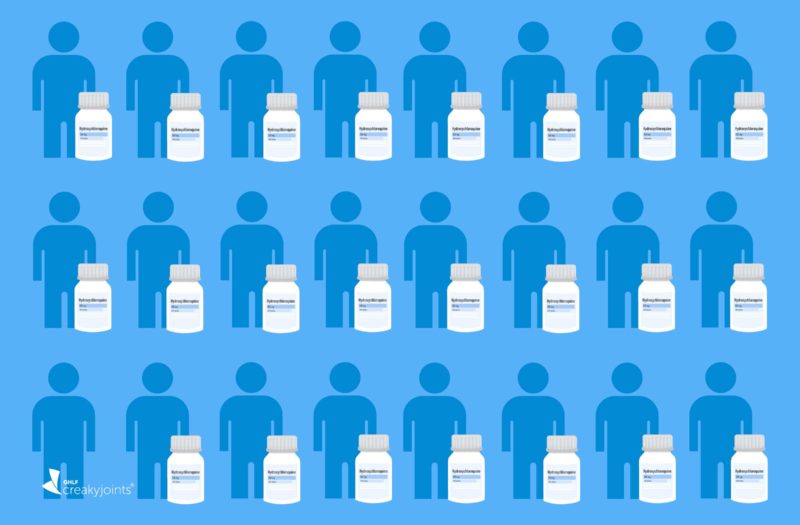Learn more about our FREE COVID-19 Patient Support Program for chronic illness patients and their loved ones.
Commonly prescribed by rheumatologists to treat conditions like lupus and rheumatoid arthritis (RA), the medications hydroxychloroquine and chloroquine were given emergency use authorization by the U.S. Food and Drug Administration in March to treat COVID-19.
The medications quickly became in short supply, threatening their availability to rheumatic disease patients who take them on a regular basis to manage their condition and prevent flares. Ultimately, the emergency clearance was rescinded in June 2020 after reports of cardiac and other serious health risks emerged and studies began to show that the medications did not prevent COVID-19 complications or deaths.
However, new data suggests it wasn’t just large health care systems using hydroxychloroquine and chloroquine to treat hospitalized COVID patients that may have contributed to drug shortages, but also a large uptick in prescriptions from providers who don’t normally prescribe these drugs.
A report from the U.S. Centers for Disease Control and Prevention reveals that new prescriptions for hydroxychloroquine and chloroquine from specialists who typically don’t prescribe them increased from 1,143 prescriptions in February 2020 to 75,569 in March 2020, which was an 80-fold increase from March 2019.
To gather this information, researchers analyzed outpatient retail pharmacy transaction data from January through June of 2020 compared to the same time period in 2019.
While hydroxychloroquine and chloroquine are being studied in clinical trials for COVID-19, they have not been shown to be safe and effective for treating or preventing the disease, per the U.S. Food & Drug Administration. There have been reports of serious heart rhythm problems in COVID-19 patients treated with either of the drugs, often when used in combination with the antibiotic azithromycin (used to treat infection) and other QT-prolonging medications (drugs that affect the heart’s rhythm).
Where New Hydroxychloroquine and Chloroquine Prescriptions Came From
In March and April of this year, non-routine prescribers accounted for the largest percentage increase in new prescriptions compared to the same time period last year. The non-routine specialties with the highest prescribing volume and growth in March 2020 were ophthalmology, anesthesiology, and cardiology.
Before this year, primary care providers and specialists who regularly prescribed hydroxychloroquine (like rheumatologists, dermatologists, and allergists) wrote almost all new prescriptions. That said, primary care doctors wrote even more prescriptions this year as well: They were behind 10,350 dispensed prescriptions for the two drugs in March 2019, but a striking 108,705 in March 2020.
An Increase in Prescriptions Among Male Patients
Due to the prevalence of autoimmune disorders among females, women have historically been more likely to receive a new hydroxychloroquine prescription than men. This report, however, shows a notable increase in new prescriptions for adult males — a 16-fold increase, in particular, in March 2020 compared to March 2019.
It’s important to note that this report doesn’t fully capture medication use nationwide, since mail-order prescriptions or those given in inpatient settings were not included in the study. That said, the data were weighted to be nationally representative, and researchers note that both providers and patients should be familiar with the potential for drug interactions and adverse events linked to hydroxychloroquine or chloroquine use.
Hydroxychloroquine and Chloroquine Should Not Be Used to Treat COVID-19
“Although federal guidelines now recommend against using hydroxychloroquine or chloroquine for the treatment or prevention of COVID-19, dispensing policies and restrictions vary significantly by state,” note the researchers.
It’s important for non-routine prescribers to continue to pay close attention to updated clinical guidance to help safeguard supplies and ensure safe use of these medications for patients with approved conditions for the drugs, the researchers add.
Currently, hydroxychloroquine and chloroquine are FDA-approved to treat or prevent malaria, and hydroxychloroquine is also approved to treat autoimmune conditions such as lupus and rheumatoid arthritis. If you’re already taking these drugs to treat malaria or an autoimmune condition, you should continue to do as prescribed, per the FDA. The benefits of the drugs outweigh the risks in these cases.
However, if you’re prescribed either medication for another reason, ask your doctor about the side effects, drug interactions, and why they’re recommending it for your particular condition. And of course, you should never take any form of these medicines that have not been prescribed for you by a health care professional.
Get Free Coronavirus Support for Chronic Illness Patients
Join the Global Healthy Living Foundation’s free COVID-19 Support Program for chronic illness patients and their families. We will be providing updated information, community support, and other resources tailored specifically to your health and safety. Join now.
Bull-Otterson L, et al. Hydroxychloroquine and Chloroquine Prescribing Patterns by Provider Specialty Following Initial Reports of Potential Benefit for COVID-19 Treatment — United States, January–June 2020. Morbidity and Mortality Weekly Report (MMWR). September 4, 2020. doi: http://dx.doi.org/10.15585/mmwr.mm6935a4.
FDA cautions against use of hydroxychloroquine or chloroquine for COVID-19 outside of the hospital setting or a clinical trial due to risk of heart rhythm problems. U.S. Food & Drug Administration. September 7, 2020. https://www.fda.gov/drugs/drug-safety-and-availability/fda-cautions-against-use-hydroxychloroquine-or-chloroquine-covid-19-outside-hospital-setting-or.






